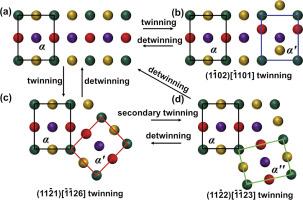当前位置:
X-MOL 学术
›
J. Mater. Sci. Technol.
›
论文详情
Our official English website, www.x-mol.net, welcomes your
feedback! (Note: you will need to create a separate account there.)
Shock consolidation and spallation in nanopowdered Mg: Contributed by deformation twinning and disordering
Journal of Materials Science & Technology ( IF 11.2 ) Pub Date : 2024-12-04 , DOI: 10.1016/j.jmst.2024.10.041 M.Y. Wang, D.B. He, W.B. Bi, M. Shang, Y. Cai, L. Deng, X.M. Zhang, F. Zhao, J.F. Tang, L. Wang
Journal of Materials Science & Technology ( IF 11.2 ) Pub Date : 2024-12-04 , DOI: 10.1016/j.jmst.2024.10.041 M.Y. Wang, D.B. He, W.B. Bi, M. Shang, Y. Cai, L. Deng, X.M. Zhang, F. Zhao, J.F. Tang, L. Wang

|
Nanopowder consolidation under high strain rate shock compression is a potential method for synthesizing and processing bulk nanomaterials, and a thorough investigation of the deformation and its underlying mechanisms in consolidation is of great engineering significance. We conduct non-equilibrium molecular dynamics (NEMD) simulation and X-ray diffraction (XRD) simulation to systematically study shock-induced deformation and the corresponding mechanisms during the consolidation of nanopowdered Mg (NP-Mg). Two different deformation modes govern the shock consolidation in NP-Mg, i.e., deformation twinning at up 1.5 km s−1 and structural disordering, at up 2.0 km s−1. They accelerate the collapse of nanopores and void compaction, giving rise to the final consolidation of NP-Mg. Three types of deformation twinning are emitted in NP-Mg, i.e., the extension twinning for , and , and the compression twinning. They are prompted via coupling atomic shuffles and slips. Deformation twinning prefers to occur within the grains as shock along or its approaching direction (A- and B-type grains), originated from the high-angle grain boundaries (HAGB) at compression stage. They are inhibited within the ones as shocking along and the approaching ones (C- and D-type grains). The release and tension loading facilitates the reversible and irreversible detwinning, for the extension and compression twinning, respectively, within the A- and B-type grains. It also contributes to a compression-tension asymmetry for twinning, i.e., release and tension induced extension twinning within the C- and D-type grains. The subsequent spallation is mediated by GB sliding and GB-induced stacking faults at up 1.5 km s−1, and structural disordering at up 2.0 km s−1.
中文翻译:

纳米粉末 Mg 中的冲击固结和散裂:由变形孪晶和无序贡献
高应变速率冲击压缩下的纳米粉末固结是合成和加工块状纳米材料的潜在方法,深入研究其变形及其固结的潜在机制具有重要的工程意义。我们进行非平衡分子动力学 (NEMD) 模拟和 X 射线衍射 (XRD) 模拟,以系统研究纳米粉末 Mg (NP-Mg) 固结过程中的冲击诱导变形和相应机制。两种不同的变形模式控制着 NP-Mg 中的冲击固结,即 up 1.5 km s-1 处的变形孪生和 up ≥ { 11 2 ̄ 1 } 〈 1 ̄ 1 ̄ 26 〉 { 1 1 ̄ 02 的扩展双胞胎 } 〈 1 1 ̄ 01 〉 { 11 2 ̄ 2 } 〈 1 ̄ 1 ̄ 23 〉 〈11 2 ̄ 0 〉 〈 0001 〉 ≤ ≥
更新日期:2024-12-04
中文翻译:

纳米粉末 Mg 中的冲击固结和散裂:由变形孪晶和无序贡献
高应变速率冲击压缩下的纳米粉末固结是合成和加工块状纳米材料的潜在方法,深入研究其变形及其固结的潜在机制具有重要的工程意义。我们进行非平衡分子动力学 (NEMD) 模拟和 X 射线衍射 (XRD) 模拟,以系统研究纳米粉末 Mg (NP-Mg) 固结过程中的冲击诱导变形和相应机制。两种不同的变形模式控制着 NP-Mg 中的冲击固结,即 up 1.5 km s-1 处的变形孪生和 up






























 京公网安备 11010802027423号
京公网安备 11010802027423号